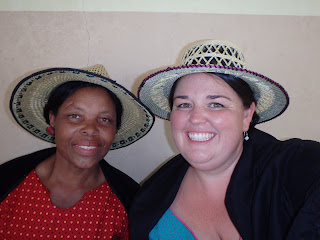In early January, I posted a hugely popular post about
Natasha and Prien’s
Wedding. I intentionally omitted a key aspect of the
wedding: the fact that neither Natasha’s mother nor father were present.
Despite the joy the wedding presented, there was a somber
note as well. Every time that reference was made to the bride’s father, shadows
passed over the faces of all in the ceremony. Natasha’s father had passed away
only six days before the wedding.
As a result, my lessons on Indian wedding traditions
included a brief foray into Indian funeral traditions. For example, much as
there are a series of rituals that occur in the week leading up to a wedding,
there are a series of prayers held on specific days following someone’s death.
While Indian weddings are brightly colored affairs, white is the color of
mourning.
And, much like
Basotho grieving customs, the wife of a
deceased man must stay home until the first series of rituals have been
concluded, in this case, sixteen days, which is why Natasha’s mother was also
unable to attend the wedding.
Natasha’s father, George, had been sick and while he was
hoping to survive to attend the wedding, he had also been adamant that the
wedding go on as planned. As a result, the couple honored her father by moving forward.
The more I learn about Indian culture, the more I appreciate
it. Much like in Basotho culture, grief does not end at the conclusion of the
rituals in the first sixteen days. There are specific moments throughout the
following year for prayers. In June, my dear friend Venilla invited me to join
her family for the six month prayers following her husband’s death.
At Venilla’s request, I arrived early for the prayers with
my sari in tow. We finished working in the kitchen, preparing the food for the
prayers while laughing together. The meals for the prayers are all vegetarian,
to maintain mourning.
As we finished cooking, the oldest daughter still at
home set up the ritual area. It included a variety of foods for her father,
incense, and flame. We changed into our outfits and began the prayers.
I remembered from the wedding that the ritual area is sacred
and therefore we approach barefoot-a cold task in Lesotho’s winter months!
Starting with Venilla, we each took a turn kneeling and saying prayers.
As we finished, we left the room so that the deceased could
come and eat the food laid out for him. It would remain there for a few hours
and would be sprinkled with water before being cleared.
As we transitioned into the dining room to dig in, our
somber mood was released and we celebrated dining together. As usual, Venilla
insisted I eat more food than I could manage and her children kept us all
entertained.
Finally, just before sunset, after too many photos and too
much food, I headed home, filled with joy at being included once again as a
part of the Naidoo family, even in the difficult moments.




















































